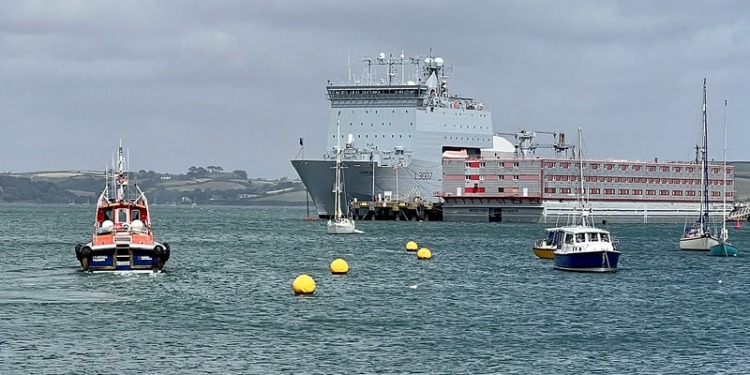In today’s world, migration challenges persist, and recent initiatives have ignited intense debate, raising concerns about the treatment and well-being of migrants.
On one side of the Atlantic, in a decision made in April 2023, the UK government announced a remarkable step towards accommodating asylum seekers in the country – a step that has fired up a lively debate. On the other side of the “pond,” in the United States, an equally controversial project has seen the light of day. Here we take a look at both.
Controversial project #1: In the United Kingdom
As stated in the UK government factsheet, the berthed vessel named Bibby Stockholm will serve as “temporary housing, aiming to reduce costs and facilitate a more orderly and efficient system for delivering asylum support.”
Located at Portland Port, this barge is set to provide accommodation for approximately 500 single adult males while their asylum claims are being processed.
However, since then, concerns and criticisms have emerged, prompting NGOs to call for its dismantling.
Critics argue that the focus should not solely be on reducing costs but rather on ensuring dignified and appropriate living conditions for asylum seekers.
The debate around the ethical implications of this approach raises questions about the long-term impacts on the mental well-being and integration prospects of migrants housed in this manner.
In the last week, Reclaim The Sea, an NGO focused on migrant and refugee rights, circulated an open letter expressing their concerns about the UK government’s initiative to house asylum seekers on the Bibby Stockholm.
From floating prisons to painting over cartoons in welcome centres, this government is trying to deter people from seeking safety in the UK through performative cruelty.
But hope will always win over hate. #StopPerformativeCruelty#NoFloatingPrisons pic.twitter.com/EGxiUNdAEx
— Reclaim The Sea (@Reclaim_The_Sea) July 8, 2023
The letter highlights the traumatic experiences many asylum seekers have endured during their sea crossings and argues that accommodating them on a sea barge, which they describe as a “floating prison.”
“For many people seeking asylum arriving in the UK, the sea represents a site of significant trauma as they have been forced to cross it on one or multiple occasions. Housing people on a sea barge – which we argue is equal to a floating prison – is morally indefensible, and threatens to re-traumatise a group of already vulnerable people.”
Furthermore, more than fifty organizations and campaigners, including the Refugee Council, Asylum Matters, and Refugee Action, penned an open letter addressed to Bibby Marine, the owner of the Bibby Stockholm.
The letter draws attention to the company’s historical connections to the transatlantic slave trade and raises concerns about the detention-like conditions that will be in place onboard the vessel. It requests a public response from the company regarding these issues.
The open letter to Bibby Marine, signed by various organizations and individuals, directly calls on the company’s CEO, Mr. Quinn, to address allegations regarding the founder’s involvement in the slave trade.
The letter emphasizes the groups’ concern for the welfare of people seeking sanctuary in the UK and argues that housing asylum seekers on the Bibby Stockholm, especially in a floating vessel, is “cruel, inhumane, and constitutes quasi-detention.”
Moreover this initiative has also been accused of not really providing a real decrease in costs as publicly stated.
A report released by NGO Reclaim the Seas, “Bibby Stockholm – At What Cost?” has raised significant criticisms on this point.
The report provides detailed estimated costs of the vessel and challenges the notion that it will lead to substantial savings or improve the existing accommodation system.
According to the findings, the Bibby Stockholm is likely to be an additional cost rather than a cost-saving measure.
The projected daily saving on the £5.6 million hotel bill is estimated to be a mere £4,694, rendering it “trivial in comparison to the overall expenses.”
Furthermore, the report argues that “there is no national emergency requiring the use of large-scale containment, other than of the Home Office’s own making due to the unprecedented backlog of asylum claims.”
Finally protests against the arrival of the Bibby Stockholm have taken place in Falmouth and Dorset, showcasing the growing opposition to the housing of asylum seekers on the barge.
“Feisty scenes” unfolded in Falmouth as protesters from Cornwall Resists, a pro-refugee group, reached the headquarters of the company responsible for work on the controversial barge chanting “refugees are welcome” throughout the day.
Controversial project #2: In the United States
Simultaneously, across the Atlantic,in Texas, USA, state officials have initiated a contentious project involving the deployment of floating barriers along the Rio Grande, aiming to “deter migrants from crossing the US-Mexico border.”
This initiative involves the installation of a floating barrier spanning a little over 300 meters (1000 feet).
As part of his anti-immigration agenda, Governor Greg Abbott‘s initiative started taking place on July 7, strategically positioned after a series of tragic migrant drownings in the Rio Grande River, which claimed the lives of four individuals.
The buoys have arrived and the installation of the marine barrier on the Rio Grande begins today. #OperationLoneStar pic.twitter.com/43VEM1tfLu
— Texas DPS (@TxDPS) July 7, 2023
As the so-called “Operation Lone Star” is nearing completion, Gov. Abbott highlights the state’s security efforts, in an interview for Fox News’ on July 15th.
“In addition to [razor wire], we now have buoys in the water to prevent people from even crossing the middle part of the Rio Grande River and coming into the state of Texas,” said Governor Abbott.
And he added:
“Because Texas has done such a prolific job of stopping people from coming into our state, you are seeing a massive increase in the number of people crossing into New Mexico, Arizona, and California.”
Although designed to serve as a deterrent, the project has faced substantial criticism and even legal challenges.
Mexico has sent a diplomatic protest note to the US government and plans to send an inspection team to assess whether any part of the barrier extends into Mexico’s side of the border river.
Mexico’s top diplomat, Foreign Relations Secretary Alicia Bárcena raised objections to the placement of barbed wire on a low-lying island in the river near Eagle Pass, Texas, emphasizing that obstructing the river’s flow may violate 1944 and 1970 treaties on boundaries and water.
Legal concerns surrounding the Texas initiative have also been raised by Americans, specifically by US Representative Veronica Escobar and seven other Texas congressional Democrats.
In a letter to US Attorney General Merrick Garland and Secretary of State Anthony Blinken, the lawmakers alleged that the floating barrier along the river border may potentially violate international law.
“Governor Abbott’s installation of floating barriers in the Rio Grande to deter migrant crossings is yet another dangerous stunt that prioritizes political posturing over the safety and well-being of both Texans and migrants,” they stated.
Related Articles: Life Change for Refugees? New EU Migration Deal | A “New” Pact on Migration and Asylum? | Will Italy Stop Saving Migrants and Start Punishing Rescuers? | Fences, Stronger Borders and Pushbacks | The Price Migrants Pay for Freedom in the US
Furthermore, concerns have been raised about the potential drowning risks associated with the buoys and the environmental impact on the river.
Scholars and experts, including Steven Mumme from Colorado State University, contend that the buoys will illegally alter the flow of the river, which would in turn change the boundary between the United States and Mexico.
Jesse Fuentes of The Eagle Pass Border Coalition voiced concerns about the security of the barriers, suggesting that during river overflows, the buoys could break away and pose a threat to critical infrastructure like border bridges.
The deployment of the floating barriers in Texas has not only faced legal challenges but has also triggered anger and resistance among local residents.
View this post on Instagram
The Eagle Pass Border Coalition, joined by supporters from the No Border Wall Coalition, has filed a lawsuit against Governor Abbott, the state of Texas, and the Department of Public Safety over the buoy barriers.
Nevertheless, Texas Governor Greg Abbott has shown readiness to face legal challenges related to the deployment of floating barriers. In a tweet, he confidently stated, “We will see you in court,” indicating his preparedness to defend the initiative.
The way forward?
These recent initiatives in the UK and Texas reflect the intricate challenges and dilemmas faced by policymakers in handling migration.
While efforts are made to manage costs, streamline processes, and enhance security, it is imperative not to overlook the multifaceted aspects of migrants’ lives.
The decisions made regarding asylum accommodation and border control initiatives have far-reaching consequences on the well-being and human rights of individuals seeking refuge.
The legal challenges, environmental criticisms, and protests against these initiatives serve as reminders that comprehensive solutions must be sought, emphasizing respect for human dignity, adherence to international law, and consideration of the broader impacts on communities and ecosystems.
Editor’s Note: The opinions expressed here by the authors are their own, not those of Impakter.com — In the Featured Photo: The Bibby Stockholm barge in Falmouth Docks. Featured Photo Credit: Tim Green.









